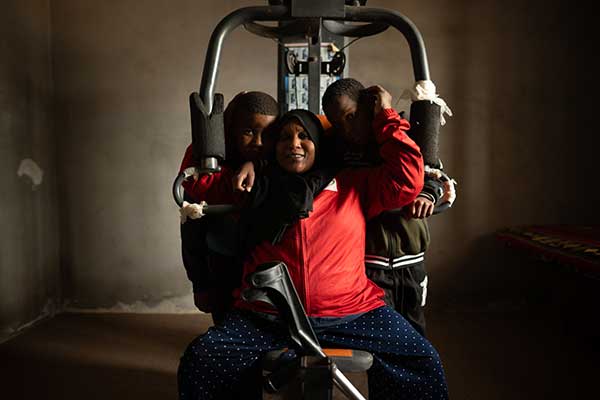
A Champion: A documentary that transcends the boundaries of sport, delving into issues of justice and rights. In a time when sport and politics intersect, and justice and rights are intertwined, the short documentary “A Champion” redefines what it means to be a champion from a different perspective. Not in the arena or under the spotlight, but on the rugged roads between the Libyan cities of Tawergha and Misrata, where Suad Rajab walks every day, carrying a body ravaged by paralysis, but with an indomitable spirit. The film documents the journey of a woman who breaks through geographical and legal barriers, placing the issue of disability rights in Libya on the agenda. It is an artistic work that transcends visual storytelling, becoming a powerful social commentary and a voice demanding dignity and fairness. – Film Information Production: Douaya Productions (2024). Director: Mohamed Mselli. Director of Photography: Mohamed Al-Qasir. Assistant Director: Nahla Ben Saleh. Story: Sport on the Brink of Suffering The film tells the story of Suad Rajab, a female athlete with a disability from Tawergha, who strives to achieve her sporting dreams despite harsh circumstances. Suad travels more than 20 kilometers daily to Misrata to train for competitions. This daily journey, with its physical hardship, financial cost, and psychological stress, becomes a symbol in the film of human resilience in the face of geographical constraints and social marginalization. Issues Raised by the Film: Disability Pension for Women The film highlights the issue of Suad’s pension being discontinued upon her marriage, according to the 1985 law, despite a 2017 law passed by the Libyan Parliament guaranteeing continued pension payments after marriage. However, political divisions led to the suspension of this law. Following widespread media and public pressure after the film’s screening, Suad’s basic pension (only $120) was reinstated, and transportation was provided to take her from Tawergha to Misrata three days a week. The film reflects the economic and social challenges faced by women with disabilities, emphasizing the importance of their economic empowerment to achieve true independence and escape dependence or poverty. Supporting athletes with disabilities Suad’s daily long journey highlights the urgent need for sports infrastructure and logistical support tailored to people with disabilities, enabling them to have equal opportunities to participate in sports.

The health dimension and controversy Suad’s disability stems from receiving a polio vaccine at six months old, which caused a fever that resulted in paralysis of her left leg. The director documented four similar cases between Tawergha and Misrata, raising questions about the quality of the vaccines or their storage conditions. This aspect adds a controversial dimension to the film, transforming it from a mere human story into a catalyst for public health investigations and institutional accountability. — Screening and Social Impact The film premiered in Benghazi, attended by the Constitutional Drafting Committee, which subsequently convened meetings to discuss the rights of people with disabilities. It was also screened in Misrata and Tripoli, garnering significant media attention and contributing to the reinstatement of Suad’s pension and the provision of transportation. This demonstrates the practical power of documentary film to influence institutions and create tangible impact. — Achievements and Festivals The film has participated in four local and international festivals to date, including: Best Screenplay Award for a Short Documentary – Libya International Short Film Festival (2024). Special Mention from the Jury – Aïn Djamna Poetry Film Festival, Makniss (Tunisia, 2024). Nominated for the Ammar El-Askari Award – Annaba Mediterranean Film Festival, Algeria (September 2025). Nominated for the HECare Festival (Toronto, Canada, October 2025). Finalist for Best Short Documentary – Algeria Awards (November 2025). — Critical Review The film “A Heroine” blends personal narrative with social and political analysis, revealing how an individual’s life can reflect a broader societal reality. The camera’s focus on the journey between Tawergha and Misrata is not merely a geographical depiction, but a metaphor for daily struggles and the unwavering spirit that defies physical, legal, and societal limitations. With its simplicity and authenticity, the film demonstrates that documentary filmmaking is not merely about recording life, but also a tool for social change and political advocacy. It exemplifies an art form that brings human rights issues to the forefront and gives voice to the marginalized. “A Heroine” is not just a film about an athlete; it’s about Libya’s struggle to reconcile with its laws and its citizens. It is a voice for women, a cry for the disabled, and a message that true heroism lies not only in winning medals, but in the ability to fight for rights and live with dignity amidst a challenging reality.

.
Aziza Hussein
Writer from Libya
.
